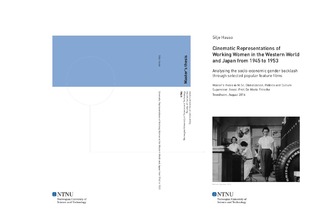| dc.contributor.advisor | Fritsche, Maria | |
| dc.contributor.author | Hauso, Silje | |
| dc.date.accessioned | 2016-10-13T11:00:00Z | |
| dc.date.available | 2016-10-13T11:00:00Z | |
| dc.date.issued | 2016 | |
| dc.identifier.uri | http://hdl.handle.net/11250/2414937 | |
| dc.description.abstract | After women joined the industrial workforce during the Second World War, they departed from their industrial occupations as post-war societies reconverted to more traditional gender roles. This thesis studies the socio-economic gender backlash in the Western World and Japan during the early post-war era by analysing the representations of working women in selected popular feature films released in the years between 1945 and 1953. Because predominant social norms are, in social film history, assumed to be reflected in the filmic images of national cinemas, changes in cinematic representations is seen to be a result of changes in the public sentiment. The feature films Mildred Pierce (1945), The Best Years of Our Lives (1947), Port of Call (1948), Summer with Monika (1953), Bitter Rice (1949), Umberto D. (1952), Early Summer (1951), and Tokyo Story (1953) are used as primary sources for analysis of the USA, Sweden, Italy and Japan respectively. The filmic representations of working women are found to change, in some cases quite clearly and in others more ambiguously, from being largely positive to negative role models as the years go by. Female characters adhering to traditional gender roles are represented more favourably than those who are seen as crossing gender boundaries. This indicates how the public sentiments as reflected in the national cinemas seem to change in accordance with the socio-economical gender backlash in the selected countries. | nb_NO |
| dc.language.iso | eng | nb_NO |
| dc.publisher | NTNU | nb_NO |
| dc.subject | social film history | nb_NO |
| dc.subject | working women | nb_NO |
| dc.subject | gender backlash | nb_NO |
| dc.subject | post-world war two | nb_NO |
| dc.subject | japan | nb_NO |
| dc.subject | sweden | nb_NO |
| dc.subject | italy | nb_NO |
| dc.subject | usa | nb_NO |
| dc.subject | film analysis | nb_NO |
| dc.subject | 1945-1953 | nb_NO |
| dc.title | Cinematic representations of working women in the western world and Japan from 1945 to 1953 : analysing the socio-economic gender backlash through selected popular feature films | nb_NO |
| dc.type | Master thesis | nb_NO |
| dc.subject.nsi | VDP::Humanities: 000::History: 070::Political history: 071 | nb_NO |
| dc.subject.nsi | VDP::Humanities: 000::History: 070::Social history: 072 | nb_NO |
| dc.subject.nsi | VDP::Humanities: 000::History: 070::Women's history: 073 | nb_NO |
| dc.subject.nsi | VDP::Humanities: 000::History: 070::Economic history: 074 | nb_NO |
| dc.subject.nsi | VDP::Humanities: 000::History: 070::Cultural history: 075 | nb_NO |
| dc.subject.nsi | VDP::Humanities: 000::History: 070::Contemporary history (after 1945): 084 | nb_NO |
| dc.subject.nsi | VDP::Social science: 200::Political science and organizational theory: 240::Comparative politics: 241 | nb_NO |
